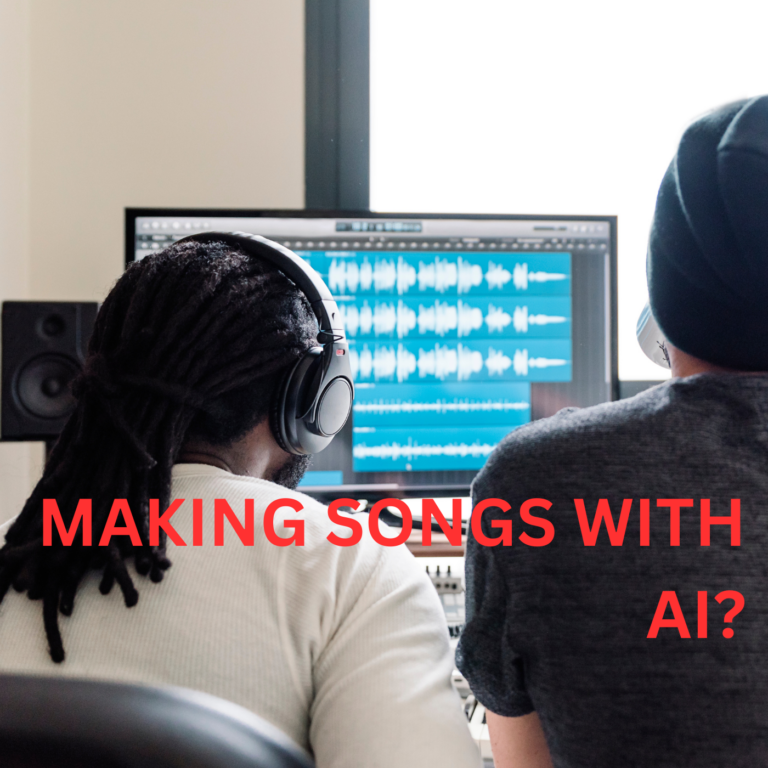Making Songs with AI: Creativity Meets Technology
The rise of Artificial Intelligence (AI) in the creative industries has transformed how music is composed, produced, and monetized. AI tools for songwriting and music production are becoming more sophisticated, enabling artists, hobbyists, and even non-musicians to create songs with minimal effort. But can you earn money by creating songs with AI? Let’s explore the possibilities, tools, and potential profitability of using AI in music creation.
How AI is Revolutionizing Songwriting
AI-powered tools are redefining the music industry by automating aspects of the songwriting process. From generating melodies to writing lyrics, these tools use algorithms and machine learning to create music based on input data, user preferences, or even specific emotions.
1. Melody and Beat Creation
AI tools like Amper Music, AIVA, and OpenAI’s MuseNet analyze vast libraries of existing songs to generate original compositions. Users can select genres, moods, and instruments to tailor the output to their vision. For instance:
- AIVA specializes in classical compositions and cinematic music, ideal for soundtracks.
- Amper Music is perfect for generating background music for podcasts, videos, or commercials.
These tools provide non-musicians the ability to create professional-sounding tracks without the need for traditional music education.
2. Lyric Writing
Writing lyrics is often the most challenging part of songwriting. AI platforms like ChatGPT or LyricStudio can generate song lyrics based on themes, styles, or keywords. Users can refine the output to align with their vision, ensuring originality while saving time.
3. Voice and Vocal Synthesis
AI isn’t just limited to instrumentals. Tools like Vocaloid and Synthesizer V can create AI-generated vocals. These platforms simulate human voices, allowing users to add realistic singing to their tracks without needing a singer.
How to Monetize Songs Created with AI
Making money with AI-generated music is entirely possible, but success depends on how you approach production, distribution, and marketing. Below are the primary ways to earn from AI-generated songs.
1. Streaming Platforms
Platforms like Spotify, Apple Music, and YouTube Music offer royalty payments for each stream. By distributing your AI-generated tracks through aggregators like DistroKid, TuneCore, or CD Baby, you can reach a global audience.
Potential Earnings:
- Spotify pays an average of $0.003 to $0.005 per stream.
- With 100,000 streams, you could earn between $300 and $500.
Success on streaming platforms often requires marketing and playlist placements to gain visibility.
2. Licensing for Commercial Use
AI-generated songs are increasingly used as background music in videos, ads, and films. Websites like Artlist, AudioJungle, and Pond5 allow artists to license their music to content creators.
- Example Use Cases: YouTube videos, commercials, indie films, podcasts.
Potential Earnings:
- Licensing fees range from $20 to several hundred dollars per track, depending on usage rights and the quality of the song.
3. Selling Songs or Beats
You can sell your AI-generated songs or beats directly to other musicians or producers. Platforms like BeatStars or Airbit are marketplaces where artists buy and sell beats.
- Target Audience: Rappers, vocalists, and independent artists looking for affordable production.
Potential Earnings:
- Simple beats can sell for $30-$50, while exclusive rights may fetch $500 or more.
4. Custom Songwriting Services
Offer personalized songwriting services using AI tools. For example, clients could request custom wedding songs, birthday tracks, or corporate jingles. By using AI, you can deliver songs quickly and affordably.
Potential Earnings:
- Customized songs often sell for $100-$500 depending on complexity and client requirements.
5. Content Creation and Social Media
Social media platforms like TikTok and Instagram are booming with music-driven content. Use AI-generated songs as soundtracks for your videos or share the music itself to attract attention. Viral content can lead to sponsorships, collaborations, or increased streams on other platforms.
Potential Earnings:
- Indirect revenue through brand deals, advertising, and increased visibility.
6. NFTs and Blockchain Music
AI-generated music can be sold as NFTs (Non-Fungible Tokens) on platforms like OpenSea or Audius. This allows you to sell unique versions of your songs to collectors.
- Example: Limited-edition tracks or exclusive album releases.
Potential Earnings:
- NFT sales can range from $50 to thousands of dollars, depending on demand and exclusivity.
Challenges in Earning Money with AI-Generated Songs
While the opportunities are vast, there are also challenges to consider when monetizing AI-generated music.
1. Competition
AI tools make music creation accessible to everyone, increasing the number of tracks entering the market. Standing out requires creativity, quality, and effective marketing.
2. Copyright and Ownership
The question of who owns AI-generated music is still a gray area. Some tools grant users full ownership of the music they create, while others may retain partial rights. Always check the licensing terms of the AI tool you use.
3. Perception of AI Music
Some listeners or clients may undervalue AI-generated music, viewing it as less authentic than human-made compositions. Overcoming this stigma often requires showcasing the quality and uniqueness of your work.
4. Marketing Skills
Monetizing music, whether AI-generated or not, requires strong marketing. Without a strategy to promote your songs, it’s challenging to gain visibility and attract listeners.
Tips for Success with AI-Generated Songs
- Focus on Niche Markets
Target specific genres, themes, or industries where demand is high but competition is lower. For example, AI-generated ambient music for meditation apps or soundtracks for indie video games. - Leverage Multiple Revenue Streams
Combine streaming, licensing, and direct sales to maximize your income. Don’t rely solely on one platform. - Collaborate with Human Artists
Blend AI-generated elements with human creativity. For example, use AI to create the instrumental track and collaborate with a vocalist for added emotional depth. - Invest in Marketing
Use social media, SEO, and paid ads to promote your music. Platforms like TikTok are particularly effective for showcasing short clips of your songs. - Stay Updated on AI Tools
AI music technology is evolving rapidly. Stay ahead by using the latest tools and features to create competitive and innovative tracks.
The Future of AI in Music Creation
AI is not replacing human creativity but enhancing it. As tools become more advanced, we’re likely to see a growing acceptance of AI-generated music in mainstream industries. In the future, artists and producers may rely on AI as an integral part of their creative process, much like using a keyboard or recording software.
Conclusion
Creating songs with AI is not just a fascinating technological advancement—it’s a real business opportunity. By leveraging the power of AI tools, you can produce professional-quality music, tap into diverse revenue streams, and build a brand as a modern music creator. While competition and challenges exist, a well-planned strategy and creative approach can help you succeed in this exciting field.
So, can you earn money with AI-generated music? The answer is a resounding yes—if you’re willing to put in the effort to market your creations and adapt to this rapidly evolving landscape. The combination of AI and your vision could be the key to making your mark in the music industry.


